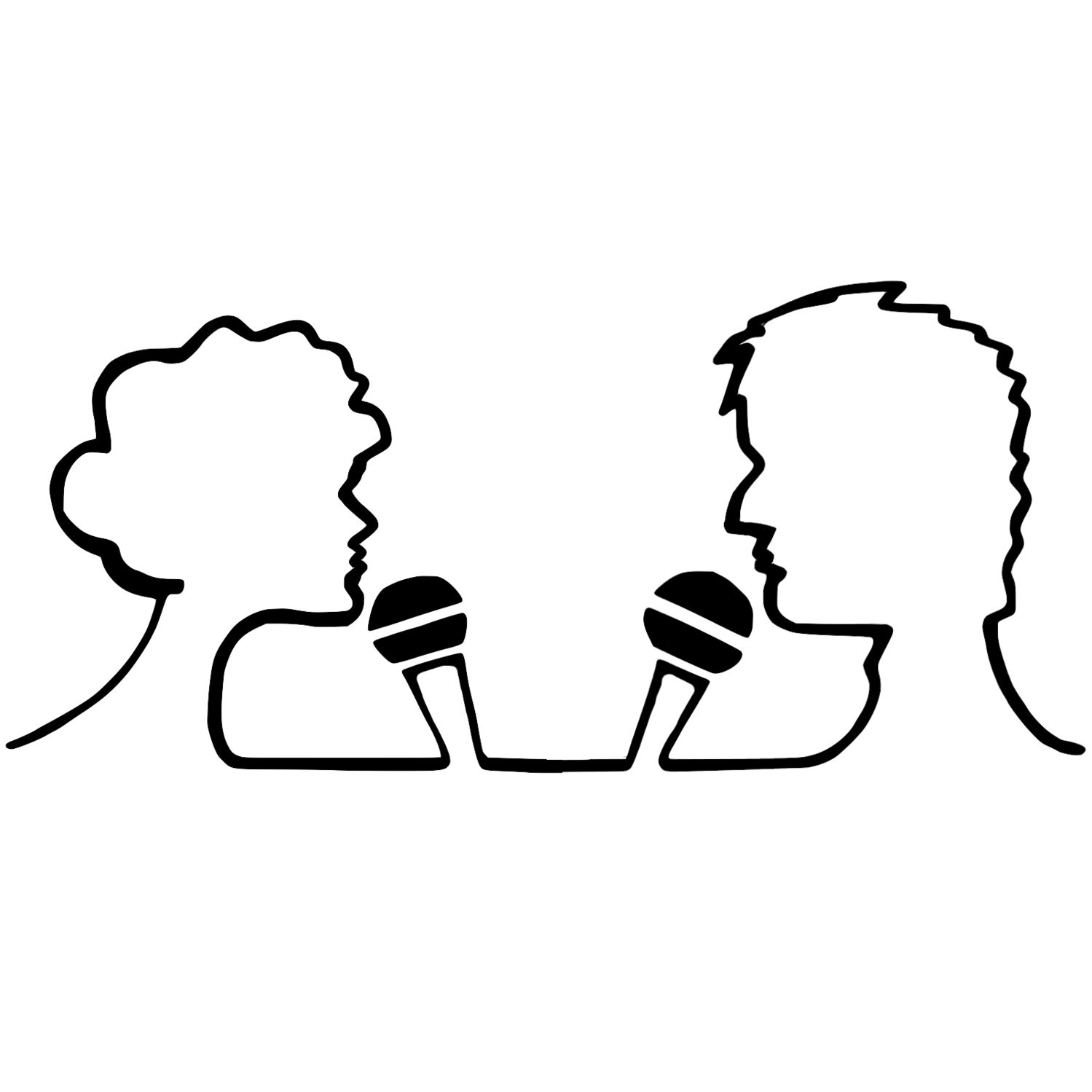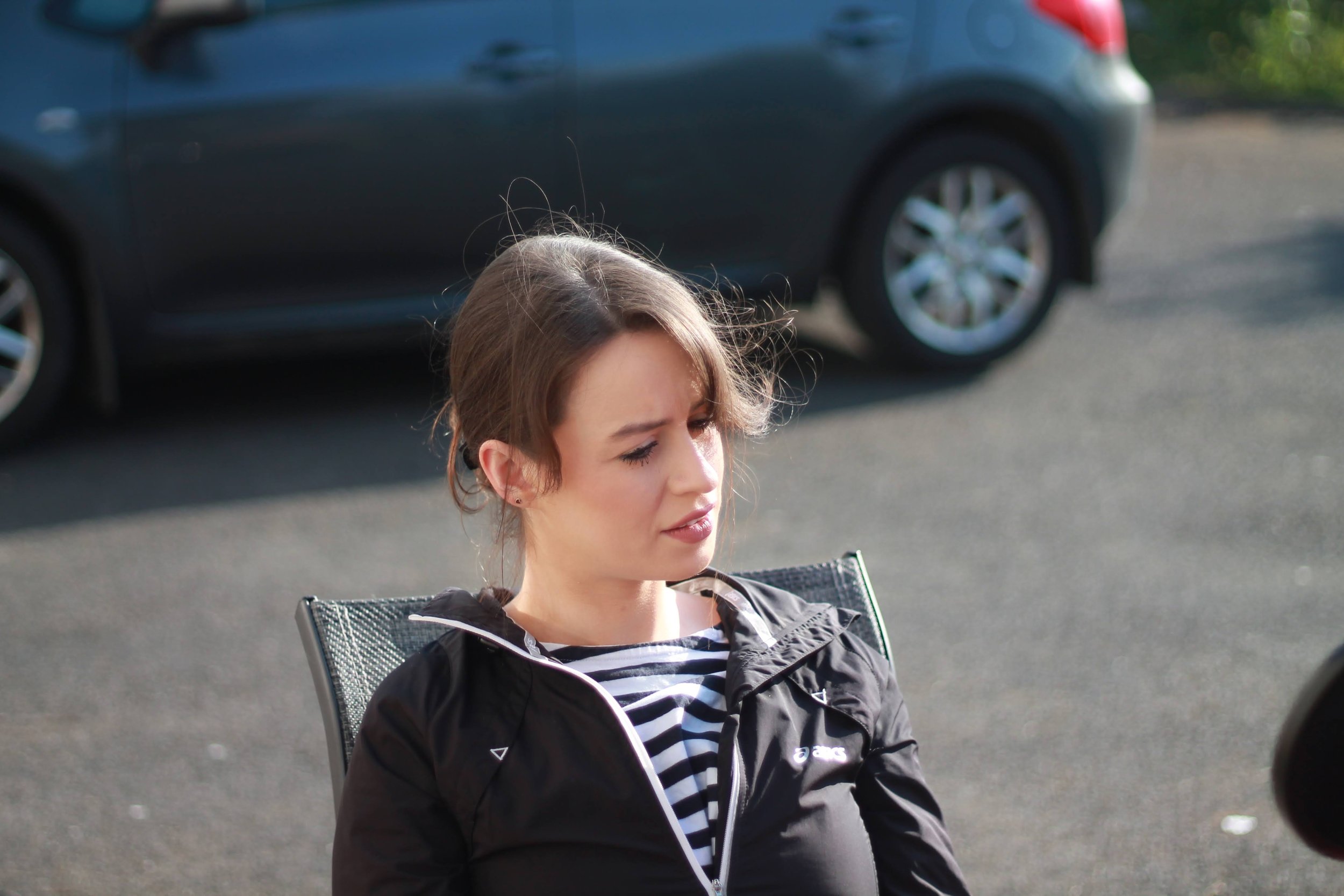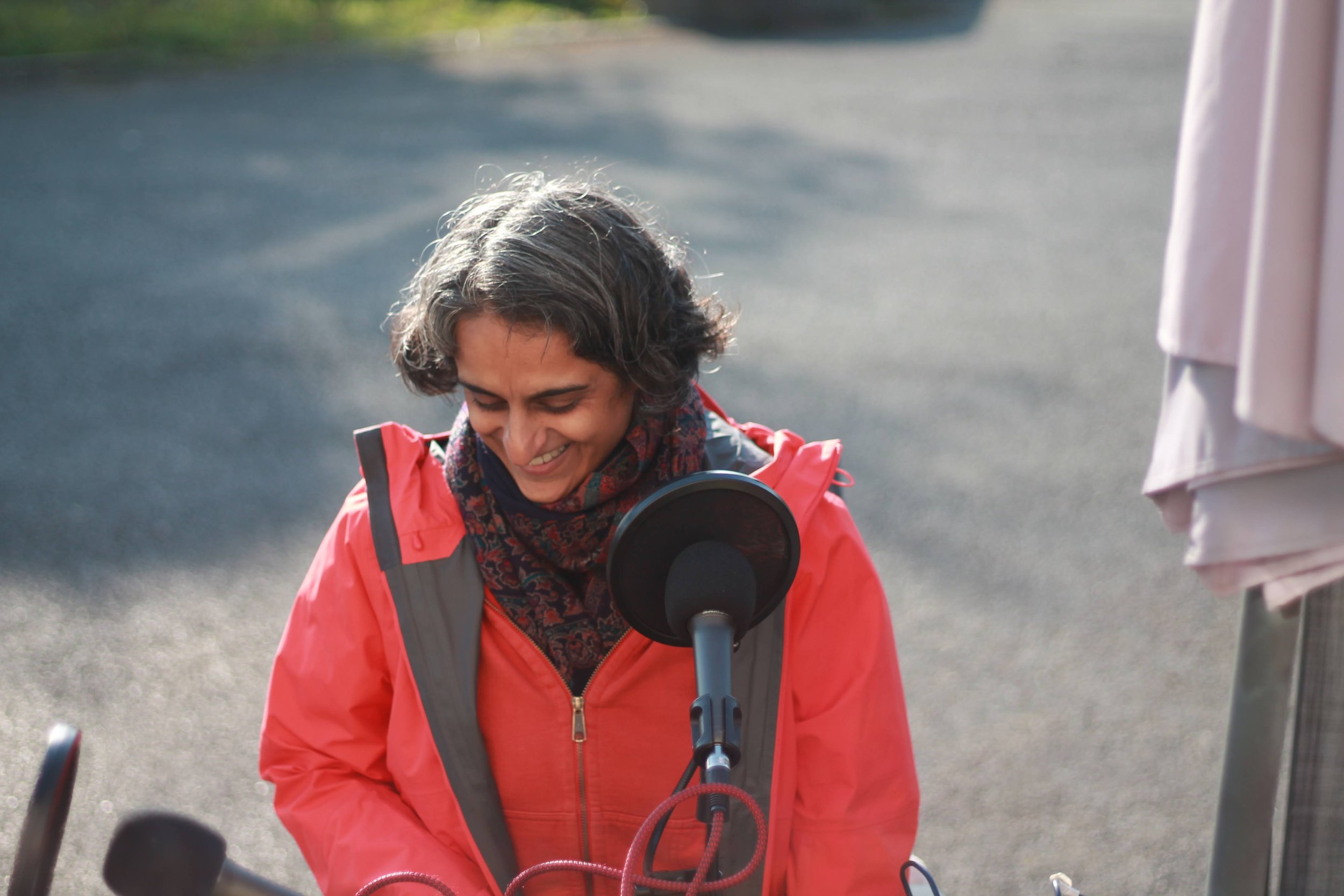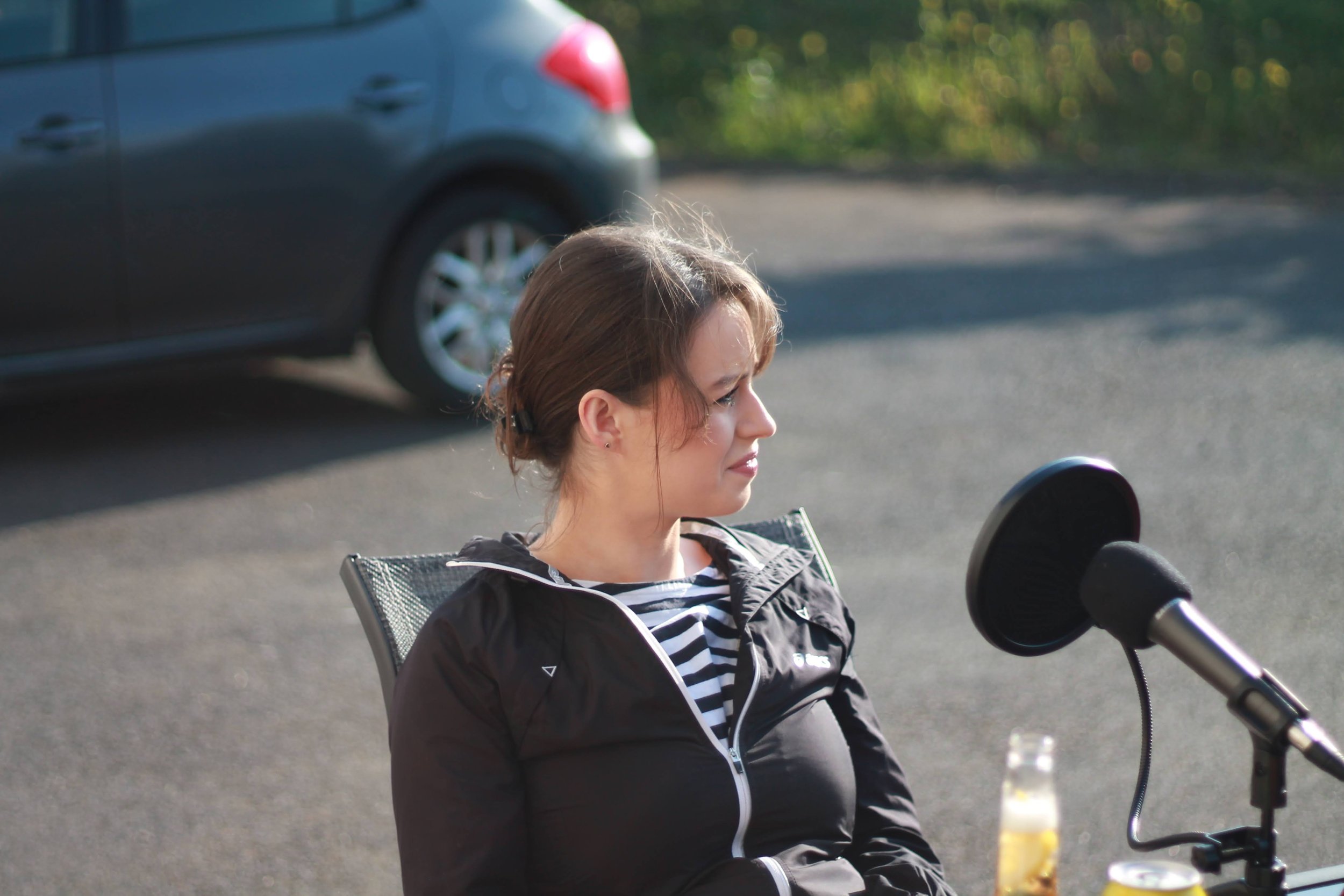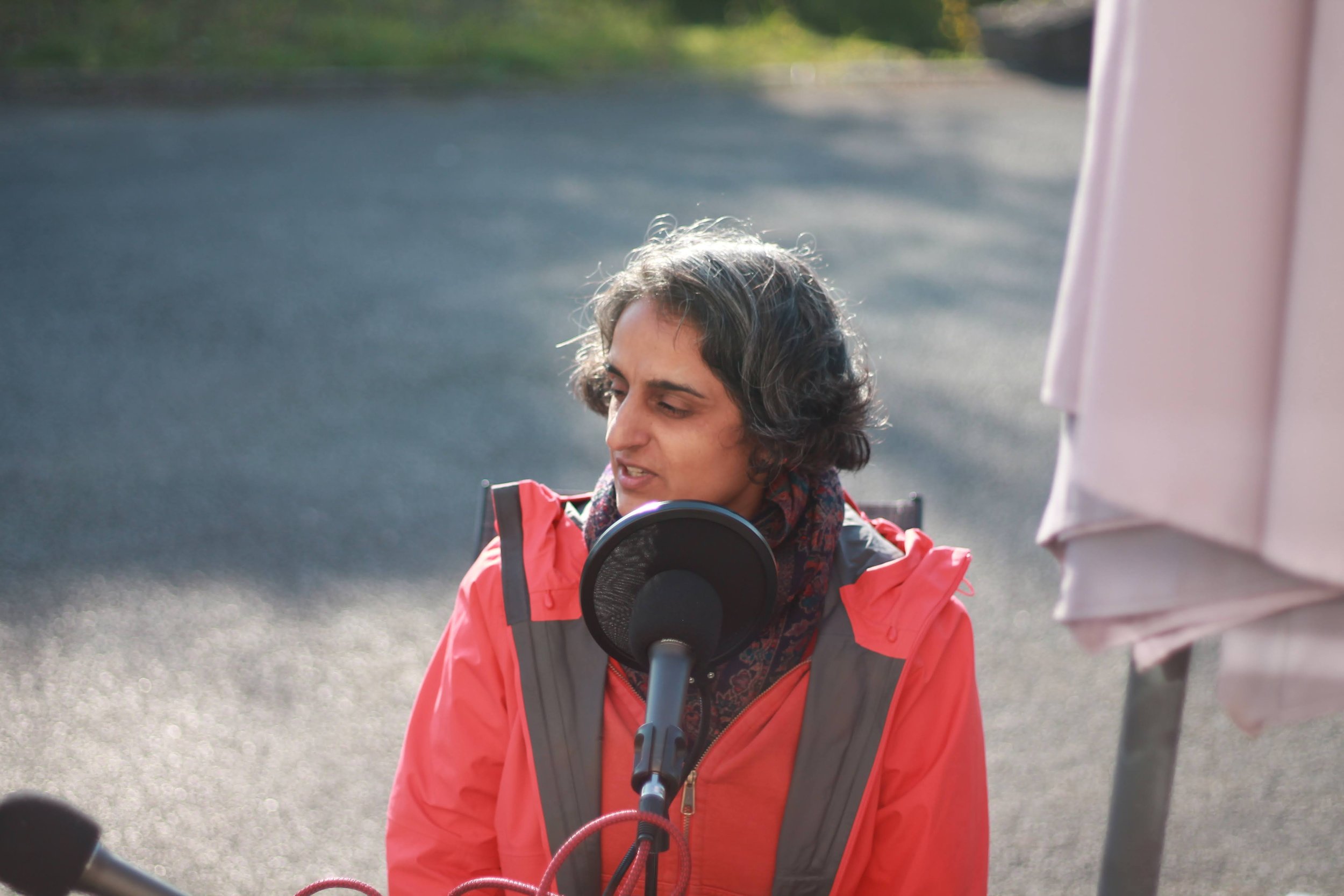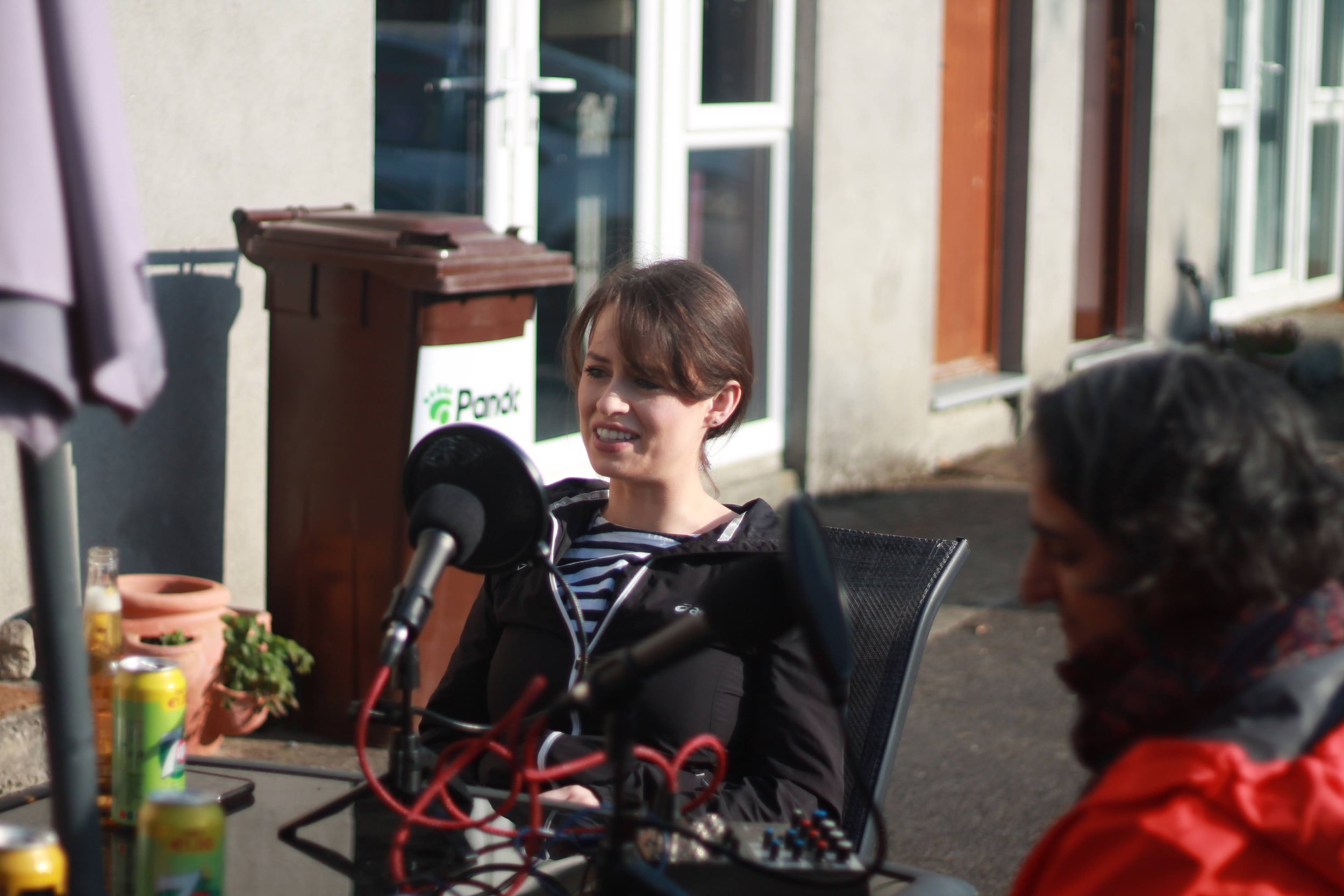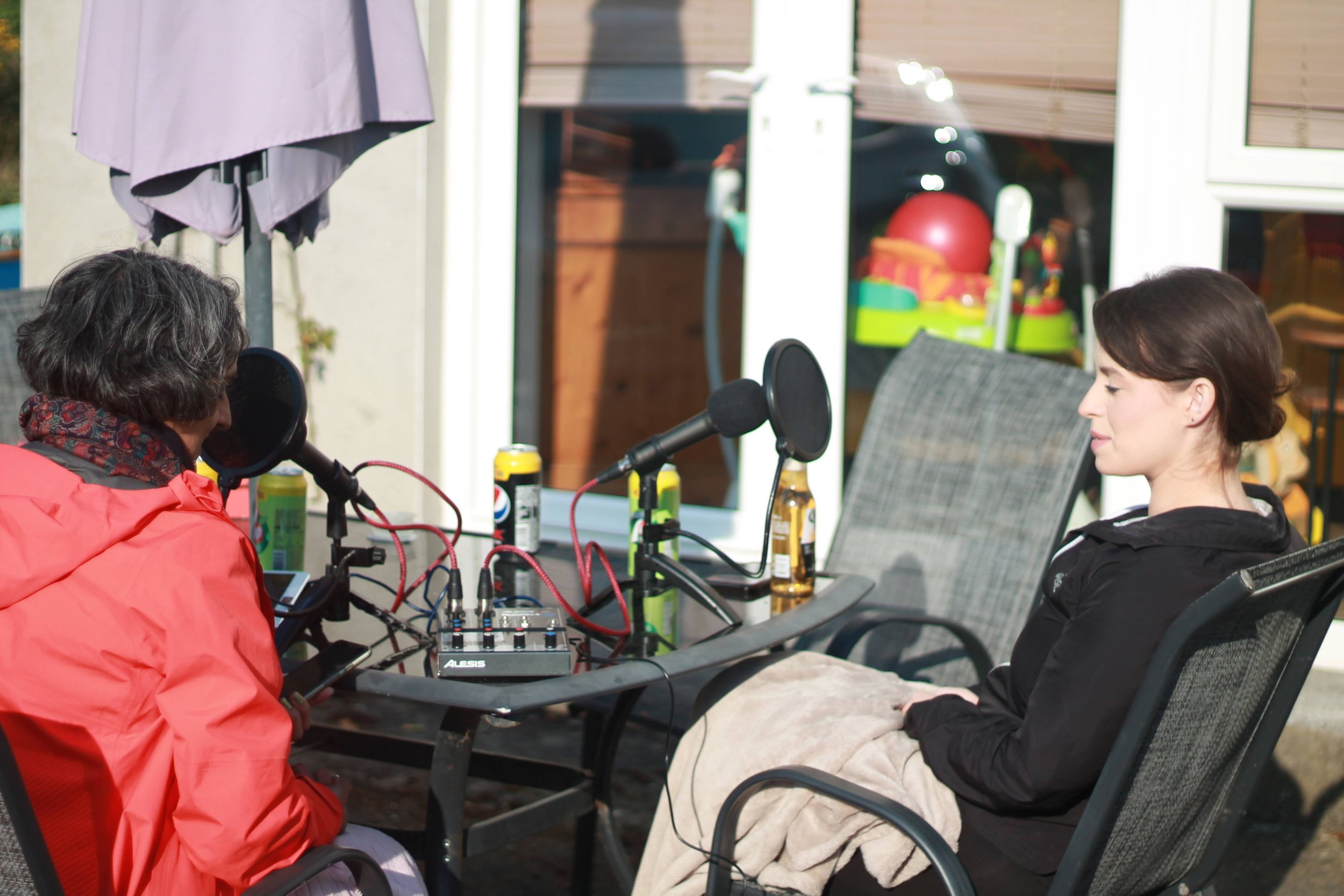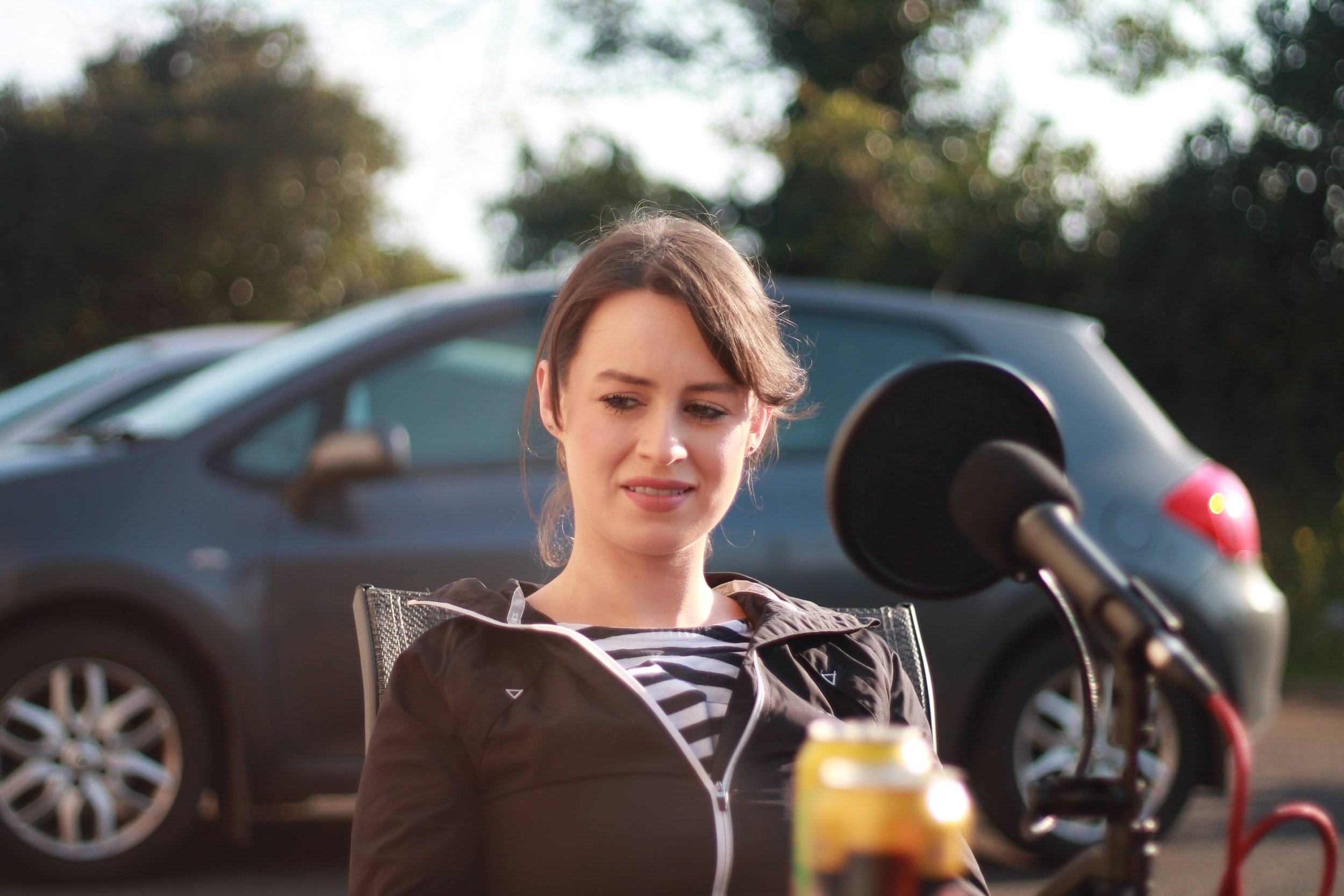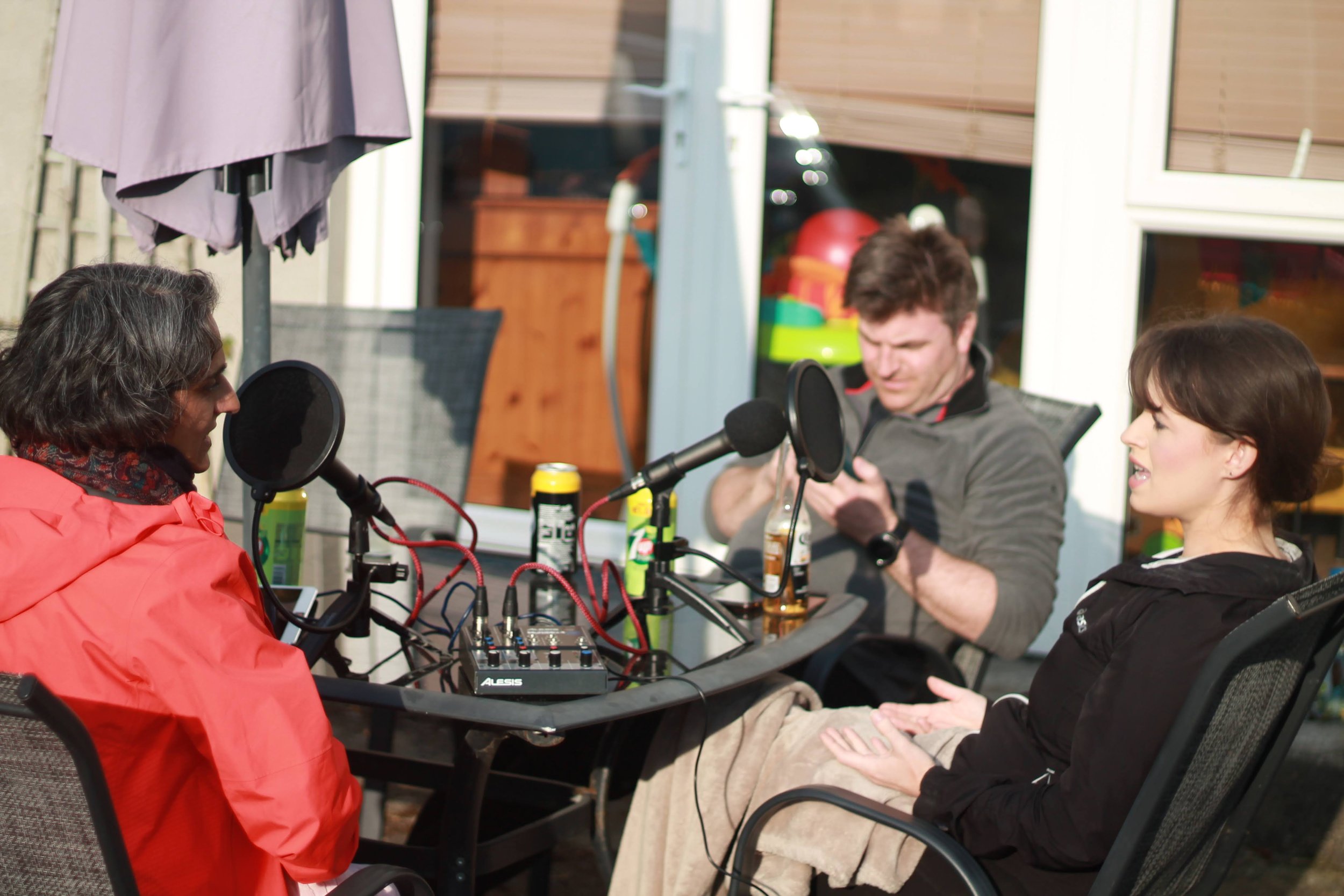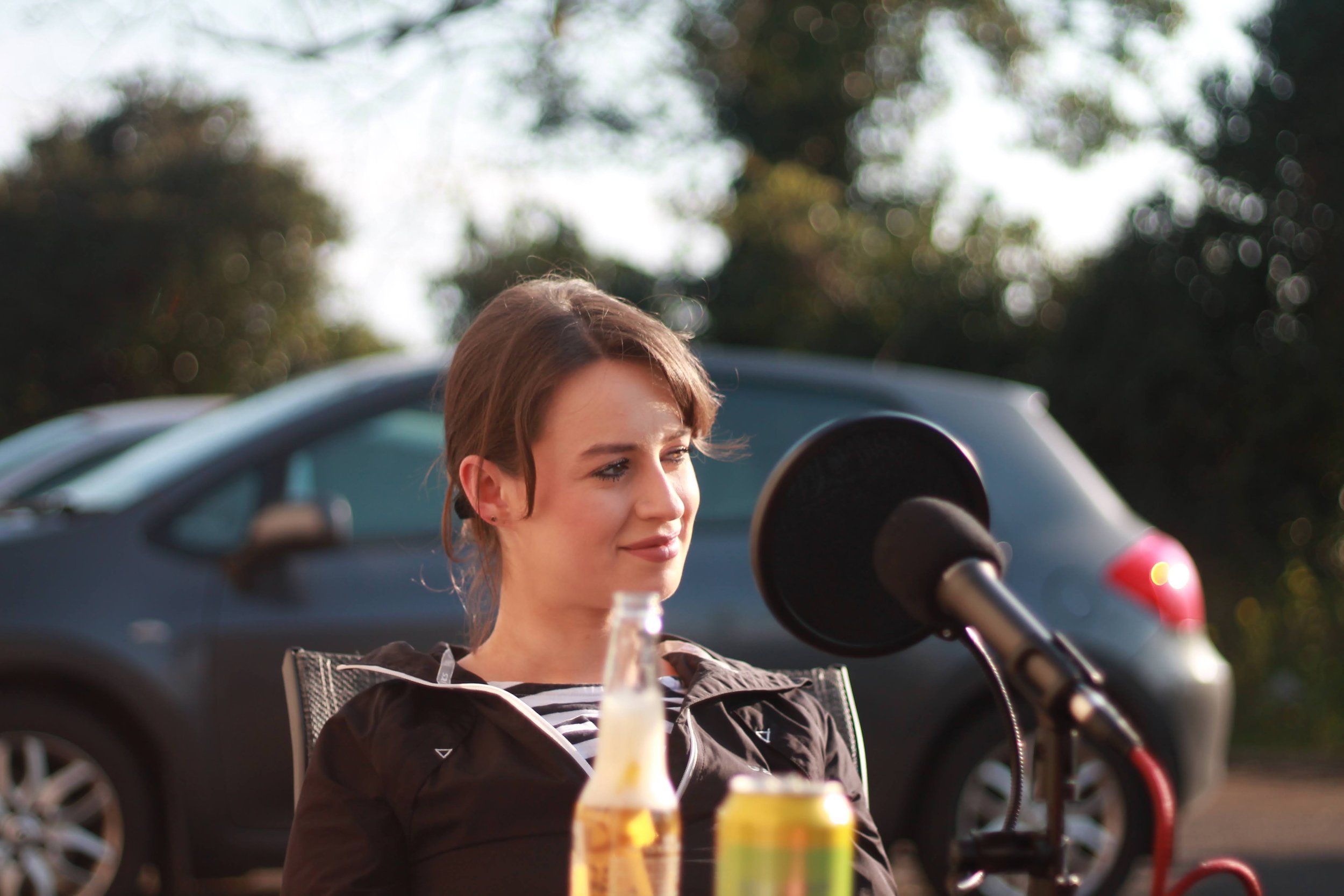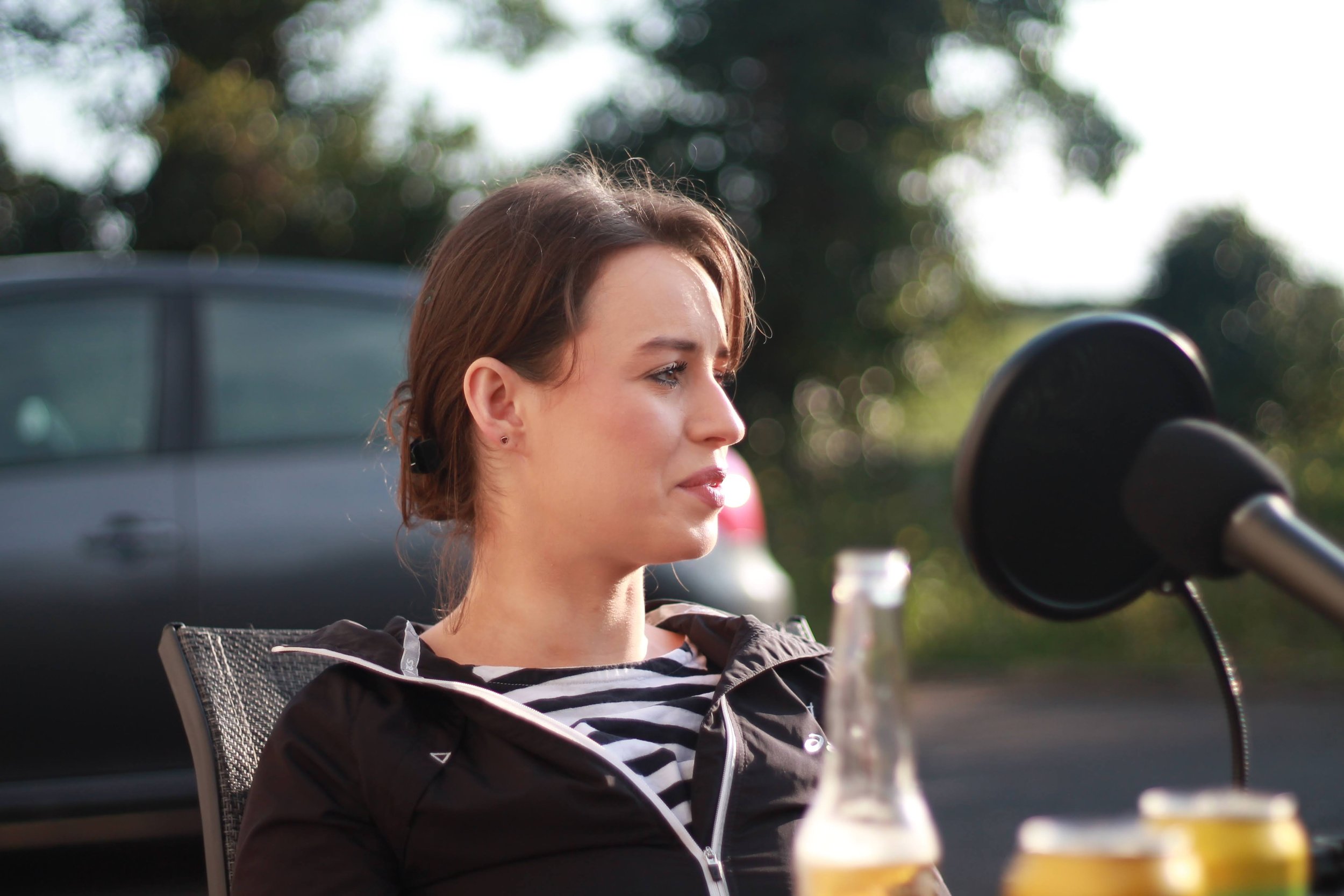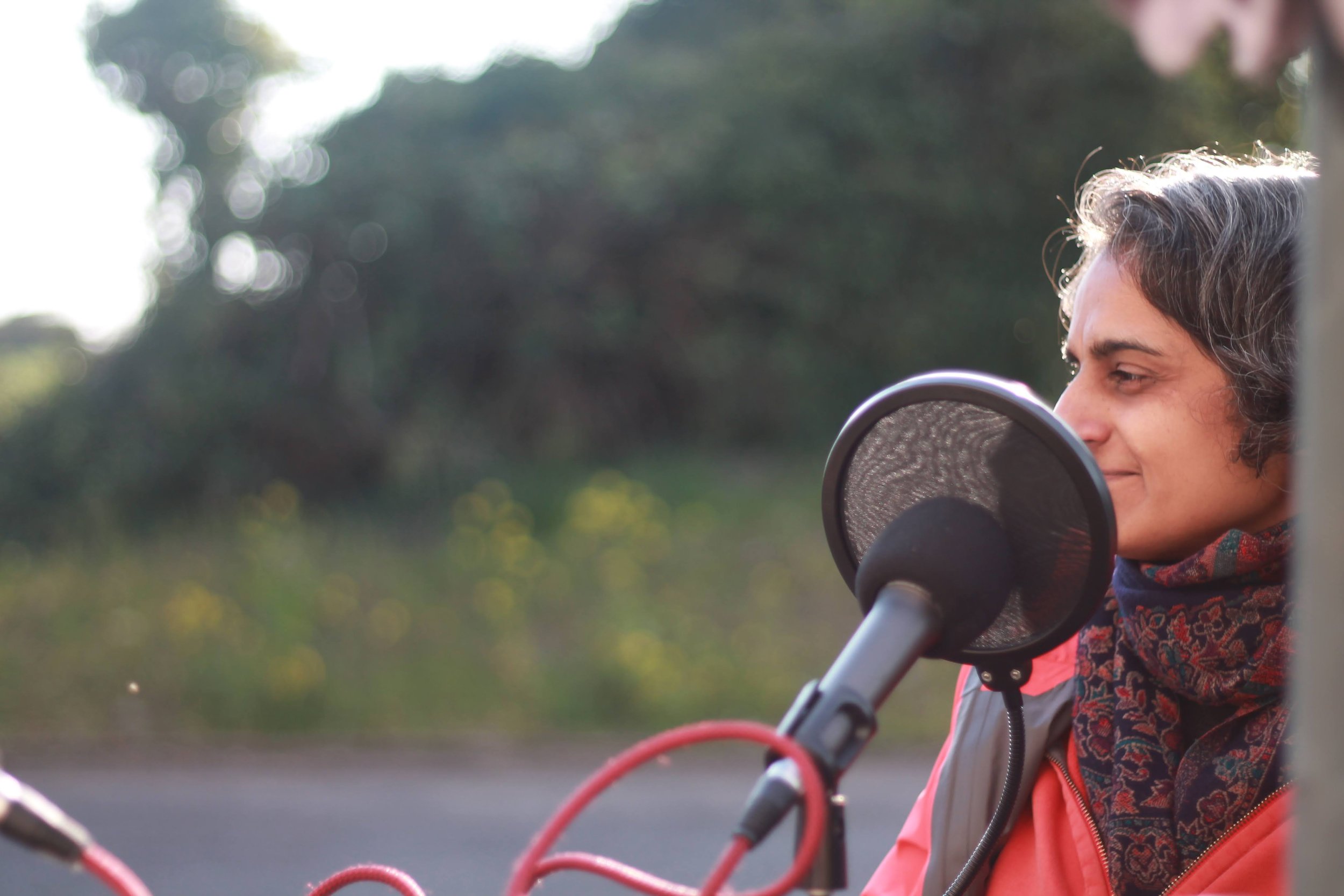The ambassador for microfluidics
Microfluidics is, as the name might imply, the study of small amounts of liquid, in a small amount of space. Now this may not sound super exciting until you hear Dr. Éadaoin Carthy talking about her field.
We trace her journey from physicist to maker of medical devices and teacher. On the way pausing to talk about Elizabeth Holmes, “The Dropout”, and using techniques to improve human and plant health.
The music once again come from: Tara & Dermy Diamond and Dáithí Sproule. We thank them for allowing us to feature the track “Maggie Pickens” from their album Seanchairde.
Listen:
Watch:
Subscribe to our YouTube channel now for all future recordings.
Episode transcript
[Background intro music playing is "Maggie Pickens" by Tara & Dermy Diamond and Dáithí Sproule]
Parmvir: All right. Hello everyone. This is your host Parmvir Bahia here speaking. Closing out our trip to Ireland with our second podcast. Today's recording is taking place just outside Dublin in a little place along the coast. Confusingly we have with us today two Davids. The first is David Basanta producer of the show. And the second for long-term fans is David Robert Grimes, a guest during season two and star of the episode, the dark night of science... or something like that. Enough about all of us though. Let me introduce you to today's scientist, Dr. Éadaoin Carthy. How's life treating you Éadaoin?
Éadaoin: Life is good. Sun is shining, which is very rare in Ireland, but we're enjoying it right now. I'm sure you probably can hear that there'll be birds in the background, so it's just nice to sit out and, uh, get some vitamin D for once.
Parmvir: Yeah,
Éadaoin: Try not be as pasty.
Parmvir: Yeah
Éadaoin: It's hard.
Parmvir: Yes.
Éadaoin: I usually get my tan from a bottle, which is, is handy for [Parmvir laughs] us pasty Irish girls.
Parmvir: Yeah. I have to say, I always feel guilty talking about the weather. I'm glad that I'm in good company here. Uh, in any case, uh, what we like to do to help introduce you to our listeners a little bit more is get you to tell us about your scientific background.
So, what was it that inspired you to kind of take up a science and in your case engineering type of training,
Éadaoin: I really fell into engineering. I'm not like an engineer by trade. I have a degree in physics and biomedical sciences from Dublin City University. And that was kind of inspired from a teacher that I had in my secondary school or from my high school.
And he was just the best teacher ever. And like, I went to an all girls school. So you can imagine, I think it was seven of us that did physics out of 120 students. So we actually got really good, uh, one-on-one attention from him. And he was just an amazing teacher and he just was really good at explaining things and making things kind of as transparent as possible.
So I was like, I really like physics always wanted to be a doctor of some sort, but my guidance counselor at my school at the time, forgot to sign me up for the H path, which is the aptitude test. She just forgot to sign me up. So I was like, right, I'm not going to hang around for another year to do it again.
I was like, I'll just do physics, biomedical science. And I could be like, um, work in the hospital as a physicist. And I was like, kind of liked my plan went and did physics and quite enjoyed it. I was a bit of a bum in college. I'm not going to lie. I didn't go to too many classes. I went to the ones that interested me but because it was physics or biomedical sciences. We didn't really have that many kinds of biology based subjects until maybe third and fourth years, we did things like immunology. And I really loved that, but it was in my third year, I had to do a lab in microfluidics and I just thought this is absolutely amazing. I thought it was so cool. Got to go in because obviously with physics, you're not doing too many like physical labs.
It's usually just sitting down doing maths, doing a lot of simulation stuff. So the fact that I could go into a lab and use things like lasers and all of these machines to create devices, I just thought this was the coolest thing in the world. So for my fourth year, my final year project. Um, I did a microfluidics-based one. And from that, I got to do like an internship with the BDI at the time. It's the Biomedical Diagnostics Institute. And from there, that's when I started to learn how to like implement assays onto these devices. And again, I just thought this is mind blowing because something like physics, you would never learn anything about this.
And that's how it all started. I, um, worked in a research group for a while and then I received money to do my PhD. So I looked at early sepsis detection within these microfluidic devices using like biosensors that were implemented with the device. So you could do like real time detection of these things.
So for, for the assay that I had developed and implemented on a device, you could have sample answer in 15 minutes. So the idea was to create an instrument that could be in an ICU unit, or just kind of in like a wet room off the ICU unit, that you could like, extract five mils of blood from the patient, pop it into device. 15 minutes later, does this person have sepsis is it a gram-positive type bacteria gram-negative or candida, when we looked at, you know, the 20 most obvious kind of sepsis causing pathogens that people would have, their candida was the fungal one. So we just kind of stuck with that. So that was my PhD. And then I started postdoccing for a while afterwards, with someone within engineering. We got funding in to look at microfluidics again, and that's how I came into engineering.
And from moving between all of these different departments, I was like, engineering is amazing and they were so nice. And like, I feel like I'm probably like the second female that they've probably ever seen in their lives, cause like, it's just so male dominated, which is fine and you can kind of see why it's very like a traditional male role that you're working with these big machines and you have to take out and like replace big parts and whatever.
Obviously that's changed now. Thank God. But going into the workshops and seeing the machines that they could use and seeing what those machines are capable of doing, I just thought this was fascinating. So I was lucky enough then to get a position as an assistant professor within the department of mechanical and manufacturing engineering, then in Dublin City University, so I've been doing that since November and I absolutely love it.
So that's, that's how I got to where I am now. That's my life story summarized in two or three minutes
Parmvir: It works for us [Éadaoin laughs]. Um, so you mentioned that you're an assistant professor now the UK system is quite different. So how does that relate to the American system, which I assume is what most of our listeners will be familiar with.
Éadaoin: I presume it's considered, like it's a senior lectureship, but again, like you, you do your teaching, whatever you're allocated to teach. So I'm developing two modules for sustainability engineering, but then there's obviously the heavy research element of it as well. So I think 50% of your workload is your research.
So you are expected to get grants in, start a research group, but in Ireland, it's very different to America. Where if you were a new hire coming into the department, um, you are given like a bit of a slush fund. So I know like if you're considered kind of a bit of a talent coming into the department, they might give you like a million dollars to start your group or kickstart your research, we actually don't have that in Ireland.
So it's really hard to kind of kickstart your research if you're just starting out. So yeah, I have a lot of like say publications in the background that I'm like kind of finishing off work. So I'm in this weird position where I'm nearly half my time, I'm still in my postdoc role, cause I'm trying to finish off my experiments. I'm trying to develop modules. I'm supervising these master's students projects. You have all these new responsibilities as a new staff member. Or like chairing of boards and like, it's just crazy. And you're, I do feel like I've been thrown in the deep end, but the support I have within the department is phenomenal.
So I'm really lucky in that sense, but it's hardcore. That's what I'll say [laughs], but I do love it. I don't, like, I never thought I was actually going to be in a position to be able to kind of teach as my job as an academic, because I know obviously that transition from being a postdoc to an assistant professor, not that many people do transition through that program.
It's very difficult to get kind of on the tenure track for academics. I know, especially within Ireland and England, but we're having like a bit of a population boom at the moment.
Parmvir: Yeah.
Éadaoin: So there's a big initiative in Ireland called the Human Capital Initiative. So they had to fund a lot of new assistant professors within the colleges to keep up the demand of new people coming into the universities as well, because especially with COVID people had more access to universities because they had the time to do so.
Parmvir: Yeah.
Éadaoin: So we did have to adopt, kind of this high flex hybrid learning model within the universities. And we're going to try to keep some elements of that to allow people to keep their jobs, do this stuff in the evenings and still walk away with a high-impact degree because DCU especially is voted top 50 young universities within the world.
Parmvir: Oh, wow.
Éadaoin: It's a, it's a credit to them because I think the university only opened in the eighties at some stage. So it is a very young university and like our employment rates are like through the roof for like graduates and everything as well. So it's a, it's a really fun campus and you can really feel that kind of energy when you're on when you're onsite and everything as well.
So it's so nice to have people back on the campus. It's so weird seeing people's faces around.
Parmvir: Oh yeah.
Éadaoin: I think it's a bit of a culture shock or something. I don't know what it is. Just like, oh yeah, this is what it's like to be a human again, to be surrounded by more than two people. And, but it's just nice to have that atmosphere back on the campus as well.
Parmvir: Yeah.
Éadaoin: I feel like I'm rambling. I don't know how I got to this point.
Parmvir: No, absolutely. I mean the, the way conversations go, obviously you, there are clearly things that you've observed during the course of your, your training and what's, what's currently happening within the world. But yeah, I mean, we should probably reiterate the fact that what is it like 97% of Ireland is vaccinated or something like that, that people who can be, are.
Éadaoin: We have a huge uptake for the vaccine, which is actually incredible because when you do look at some countries that the uptick isn't as much as here -
Parmvir: Talking to two Floridians here.
Éadaoin: Yeah [both laugh]. I mean, you you've seen the worst of it, but it's just, I'm saying this, my dad isn't vaccinated. He is one of those. And I love him to bits and his, the thing that my dad is, he's so intelligent, but he just didn't get the schooling. Like back in Ireland, back in the seventies and eighties, it was okay for a 12 year old to drop out of school and do a trade.
And that's what he did.
Parmvir: That is bananas.
Éadaoin: It's crazy. When you think at 12 years old to move out of home, to move somewhere else, to do a trade, like you're literally an infant. It's just crazy to me. And that's what my dad did, but he's, he's a carpenter, but he is, he's got such a knack for maths. And I think that's where I got kind of my love for maths from as well, because I mean, when you think about it, a carpenter, you're, you're, you're doing calculations in your head all the time.
Um, but because I think he didn't get a formal education. I think he was more susceptible to this kind of misinformation, mal-information regarding vaccines and all these different things. He just never got vaccinated. And then he was, you know, he goes on his rants from time to time. It was like this bloody vaccine. It's killing everyone. And it's like, well, it's kind of doing the opposite, but anyway.
But in our end, we are very lucky that people were just like, people were being sound people saw the effects that it was having on the healthcare system and the healthcare workers. And I think it's cause Ireland is quite small, that we're all related to someone that's, everyone has an auntie who is a nurse, I think it's a given.
So, like I have a few aunties that are nurses and they were kind of reporting back of what they were seeing and just the states that our hospitals were in and what were happening to certain people. And then the long-term effects of getting COVID as well. When you were not vaccinated, that's kind of the scary thing as well, because people are getting like longterm heart conditions and lung conditions.
And we, we still don't know the effect of COVID that people, when they had COVID of what that's happening on their body for long-term effects, that's the other scary thing on top of it. Obviously people who got it and passed away. Maybe they were like older immunocompromised, but it's the young people that didn't get vaccine got COVID and now they have heart conditions and you're just like, this is all preventable, which is the really, really sad thing about it as well.
But there's just so much crap on the internet. It's just so hard to see what is actually good information bad information. And that's where the problem lies. It's Instagram, it's TikTok. Because it's so easy to access
Parmvir: YouTube.
Éadaoin: YouTube, yeah. You're just like, it's all clickbait stuff. You could be just like swiping on TikTok on Instagram and something, obviously it's like, oh, if you get vaccinated, your child is going to have autism or you don't these, these crazy facts book because it's such captivating information.
That's, that's the stuff that sticks with you rather than, oh, vaccination saves lives. It's shown to eradicate polio in whatever year, peep that does not stay with people because it's just a fact where it's like, oh, Mary down the road got vaccinated and she grew a third arm. Oh, that's crazy. Don't be getting vaccinated kids because that's the information that stays with you.
And it is depressing.
Parmvir: It is.
Éadaoin: Yeah,
Parmvir: It is
Éadaoin: Social media actually depresses me. I say that, but when I go on Instagram, it's just full of dog videos. And that also makes me very, very happy.
Parmvir: That's the thing. I mean, you get what you want out of it, right?
Éadaoin: Um, yeah. There's algorithms that obviously like whatever your liking or whatever.
So, but so obviously mine is cooking and dogs. I'm like, wow. They know me really well [both laugh].
Parmvir: So, uh, kind of related to that subject, first of all, I am going to ask you for a definition of what microfluidics actually is, because in one of your emails to David, you stated you're an ambassador for the subject
Éadaoin: I do love microfluidics.
I just, I really do. Everyone's like, you're such a weirdo, cause your eyes light up when you talk about microfluidics and I'm like, it's awesome. It's so cool. But like microfluidics, it's simple as anything it's been around since like the sixties or something. But it's just the study of fluids on the micro and nano scale and that's and the manipulation of fluids.
So like I'm looking at it from more of a biology side, cause I do point of care testing. So, and blood is quite a complex matrix, but you centrifuge it down. You have your different components, red blood cells, white blood cells, you have your proteins plasma, everything. So in microfluidic channels you can do all of these kind of centrifugation and everything on a smaller scale.
And from that, if you're scaling everything down, Essentially on surfaces, such as biosensors cells are much larger than they would be if you took five mils of blood from a person, if you only have 10 microliters, it's easier to kind of capture things like pathogens because you're shrinking down your space. And it becomes more specific when you're working with like say antibody capture services and everything as well. So that's my line of work with microfluidics it's microfluidics within, um, like microfluidic platforms that are used to like test for diseases and everything. So I'm more of the, like the life science applications for microfluidics, but like it started from people using ink jet printers,
Parmvir: Ah.
Éadaoin: Printing toner that's like hydrophilic or hydrophobic and you can manipulate the flow of liquids, even just use it, just printing off a sheet of paper and dropping fluids onto it. And you can separate fluids out and join them back together. So it's very cool. Like you can try say, like if you had a 10 step assay, you could trigger which ones, which liquids to mix in a different sequence based on how you design your channels. If you want to make them hydrophilic hydrophobic, you can introduce valving, wax valving. You can like melt with like lasers and different things. You're actually, you're incorporating a lot of weird things, but the fact that you can like essentially lateral flow assays, that's microfluidics, cause it's the flow of liquid through porous materials.
So it's, it's competitor reaction, your, your driving force of whatever it's going to be 10 microliters, 20 microliters. So that's technically microfluidics. So that's something that we all know, but we wouldn't technically know that it's microfluidics and also point of care testing as well.
Parmvir: Yeah. So lateral flow assays for the folks who don't necessarily know this terminology, this is the rapid antigen tests that we have for COVID.
Éadaoin: Yes, exactly. actually during my PhD, um, I got to go to a university in Tarragona in Spain and they developed lateral flow assays. It's called the Selex process, S E L E X. So it's how you make, strands of DNA, very specific to a target analyte. So we were actually developing lateral flow assays to detect e-coli in water samples and a milk samples.
And they were one of the first labs in the world to actually develop the antigen test lateral flow strips within the devices. They wanted the first groups in the world to actually develop it for COVID.
Parmvir: Oh.
Éadaoin: Yeah, absolutely amazing. So like when this is in Spain, I think they were supplying them to their local hospitals and like the local police stations. They were obviously where they were needed most because they just didn't exist yet. They weren't commercially available. So, I mean, I think this is the end of 2020 they had this developed. That's like, that's how fast science is moving during the pandemic as well which is just crazy to think about, because I mean, even how fast the vaccines were developed, the fact that we could get these tests delivered to everyone's homes and test for COVID.
Like, I don't, I don't think people appreciate how amazing that is. I mean, we obviously take it for granted because we just go into a shop and buy an antigen test to see if you have COVID. But like, when you actually think of the amount of scientists that worked on this within that lab, I'll say they worked during the pandemic and everything was shut down and they got special permissions to go into the lab and they were working like crazy over time, like 20 hours a day, 22 hours a day to try and get this very specific capture antibody or capture "aptamer" that is very specific towards the COVID virus.
Parmvir: Yeah.
Éadaoin: Compared to anything else to try, obviously stop false, positive, false negatives. So yeah, one of those is developed in a lab that I worked in and like, that's how I, I actually developed some of those tests that I'd actually would like to do that work again, because it's just really cool.
Parmvir: Yeah.
Éadaoin: It's amazing.
Parmvir: So I think one of the other things that you ended up doing was. You worked on the PCR tests as well. Is that right?
Éadaoin: I've worked with PCR, not PCR for COVID.
Parmvir: I see.
Éadaoin: But a lot of my work for my PhD was looking at pathogen detection. So I looked at, you know, um, bacteria that may cause sepsis, I looked at E. coli in water samples, different things like that.
So one of the detection methods that you can use is PCR. So obviously PCR is just this amplification process where you're trying to amplify it per target. If the amplifies it's in the sample, if it doesn't amplify, it's negative for what you're testing for, but I'm still using kind of PCR and a lot of work that I'm doing now for plant pathogens stuff.
Parmvir: OK.
Éadaoin: I clearly love pathogens because [both laugh] everything I do is surrounded by them. So I'm looking at plant pathogen stuff at the moment. So I'm looking at CMM bacteria, which is very specific to tomato plant. So it basically is tomato blight, but because tomato is the biggest food crop in the world, which I actually didn't know until recently it accounts for something like 16% of total food produced in the world is the tomato.
Parmvir: Wow.
Éadaoin: Yeah. Crazy.
Parmvir: Okay.
Éadaoin: Billions and hundreds of billions of tons of tomatoes are produced every year. And then obviously we have the tomato blight. So, so many crops are destroyed if they get this, this disease. Um, so I'm looking at, you know, taking maybe a sample from a leaf and being able to put it into one of my devices and again, run PCR on it. And if it's positive, they would have to destroy a certain area of the crop. So, because this test can be done in 30 to 45 minutes, you could probably target the area of the crop that you want to look at. If you suspect it of being kind of infected with the blight. So you can actually zone off the areas that may need to be destroyed.
So you're going to reduce the amount of food that is wasted then in the world as well. You know? Well, that's the idea behind it, but. If it works, it works. If it doesn't, I mean, it's science, it's probably not going to work [both laugh] well, you have to admit that 99% of the stuff we do in the lab is just thrown out discarded.
We hope to learn from it. Sometimes these things don't work. And I think you just have to accept that, but I've got preliminary data that is working. Like I said, I'm in this kind of weird position where have a lot of ongoing projects when I was a postdoc. So I'm kind of like still in the lab all the time.
And some of the more senior professors just like, Nope, what're you doing? Stop wasting your time, get a student to do it. And I was like, well, I actually really liked being in the lab. And I was like, I feel really bad, just like offloading work to someone, but obviously that's research as well. You can't do everything yourself.
The whole point of research is that it's a collaborative process. And the crazy thing is like, you obviously learn way more than like you would yourself sitting at home reading papers or something. You could just simply ask it, a question to a person and it could be answered within two seconds. That's their area of research because even I was chatting with a professor a few weeks ago, he looks at the CRISPR CAS stuff. Yes, so the DNA editing. That's his big area of research. And one of his students is kind of adopting microfluidics for one of his projects. And he just asked me a few questions behind it. And to me, this is so simple. And I was like, oh, it's just, you know, X, Y, and Z. You just have to design it this way or invert this way.
And you get proper flow and you have to be mindful of the dimensions here because I can't even remember what the conversation was. He was just like, that's really interesting. I never would have thought of that. And I was like, this is kind of like microfluidics 101, but in my head. I was like, actually, if I have asked him anything about DNA or CRISPR, he would probably think I'm an idiot.
He's like, well, that's clearly like the easiest thing in the world that you're asking me about. So, I mean, it's good that I'm very chatty, so I can just go straight and I'm like Hi, I need help. Okay. Thanks a million, rather than just Googling things, cause once you go onto Google and you try and Google an answer, you're on it for like six hours and you go down this weird research rabbit hole, and then you're more confused than when you started.
So it's just easier to ask. So
Parmvir: It's a much easier way to start collaborations with people or at least kind of get a feel for what other people do.
Éadaoin: Oh really? I find it, my university can be a bit strange in that sense where I feel like, especially in the department that I did my PhD in, I feel like everyone had to felt like they had to hold their cards quite close to their chest because of like, oh, well, if I have this discussion with this other professor, they're going to steal my idea and they're going to run with that.
And when you think about it, it's like, well, unless they do pretty much the exact same research as you, that's not going to happen because you're the expert in this field. If you're mentioning your idea to someone else, it is very unlikely that they're going to run off and steal your idea and do research around it and publish a paper on it before you do.
So, just talk to one another and the crazy thing was in that department, no one knew what anyone was doing. It was always the PhD students that were obviously quite close knit. So it would be the PhD students that we've talked on. And like someone might be kind of like, you know, having a bit of a breakdown at lunchtime because I mean, well, I mean, PhD students would have breakdowns all the time and they'll have a breakdown.
Like I really need to use this instrument and someone would be like we've had that for years in our lab, just call up and use it. And that poor student could have been three months trying to find it or get quotes to try to buy one in, and there wasn't enough money in the budget. Whereas if the professors just talked to one another, this could have been solved months ago.
In my new department in engineering, that's actually not the case. Everyone's like pals. We actually do staff hikes as well, which I think is really cute because like, obviously everything was closed during lockdown. So like we couldn't go to the pub or have a Christmas party. So we actually had a hike in Glendalough for our Christmas party. It was just so nice. I just think they're the nicest department ever.
I love them [both laugh].
Parmvir: Yeah. I mean, I know people say, don't think of your, your work as your family, but sometimes it helps when you have people that you can rely on in that sense.
Éadaoin: Yeah. I mean, I definitely lucked out because I know a lot of people that, they do go to work and that's it. And they can cut themselves off at five o'clock comes that's it.
But I think with research, you just can't do that. Your head is always working. You need a hobby anyway, to get your head out of the lab and everything, because you could be on the computer till like midnight, and then you do, then you realize it's midnight and like, Oh, I didn't [Parmvir laughs] watch my Netflix show today.
And you're just raging with yourself. But like, it's nice that I do kind of view them as like a family. Like my old boss, his name is Dave because you know, everyone is called David.
Parmvir: Everyone is called David.
Éadaoin: And I always say, he's my work wife, because we've worked together for so long. I just to a point now we actually bicker like a married couple and everyone else is laughing at us.
Cause I'm like, oh you stupid eejit. Like, why you, why did you do this? Or why did you send that email and CC me on this now I've gotten like a hundred emails from people that I don't want, and we're always bickering with one another. And everyone's like, are you okay? I go, yeah, we're best friends obviously. But like, you can obviously talk like that.
So even when I go in to work, I have my work wife there. I have everyone else that we're pals with. I mean, it's like, it is like a little family. It's like a little community and you know, anyone gets good news, bad news. Everyone's there for one another. And that's really important because academia is very head heavy.
So you do need that kind of like outlet within your workplace that you can actually kind of relax or you can confide in someone as well. Because I read a report from years ago that 50% of all PhD students, uh, suffer from severe mental conditions afterwards. So it could be severe depression, so one in two.
And I can totally see that from my group of friends, we were all quite poorly managed. And so we just felt this enormous pressure. And a lot of pressure was always put on us and PhD students especially are paid very poorly in Ireland. So like trying to live in Dublin on a very bad wage, you're working crazy hours.
The old expression shit rolls downhill definitely applies. So everyone you do kind of cling to your fellow PhD students but there's just a lot of pressure on them. So I just think yeah, just get a hobby for yourself. Try chill out, have your little community within work because it all works out in the end.
Hopefully.
Parmvir: So what's your hobby?
Éadaoin: I am actually going to start, I'm going to join a choir.
Parmvir: Oh, fun!
Éadaoin: I love singing. And I was in a musical society before a few weeks, maybe two years before the pandemic hates, turns out the world's worst dancer, but like, I can hold my hands up in the air and tell me this, unless I'm in a nightclub, like fist pumping and like, that's the only dance move I can do.
So my two left feet were, just weren't good in like a musical theater setting. So I can admit that. So I would like to do something like a choir where I get to stand still and still enjoy singing, but it was a lot of fun. It was different. It kind of put me into like, or it took me out of my comfort zone, I would say.
And to try dancing, but yeah, I was like, oh no, it's not, for me. I'm kind of done embarrassing myself for this amount of time, but it was really fun. We actually got to perform in the National Concert Hall in Dublin. So it was big audience thing. It was like 2000 people or something. So for like something I never had really done this before. I always loved singing. Have a great time, have performing my concerts in the shower and everything, but you know, taking the out of the shower and actually doing it front people, you just like, oh yeah, this is very different, but it's nice. And like, I'm kind of getting to this age where I'm kinda like used to like public speaking, things like that.
That's something I would have always hated, but you do get used to it. So, I mean, I could try to get better at dancing, but there's no point.
Parmvir: You're going to record podcasts with us instead.
Éadaoin: I feel like this is, yeah, I'm going to be recruited. I can get flown over to Florida and we'll have a great time. You do have Disneyland.
I will have to come over.
Parmvir: [Sighs] Uh, yeah.
Éadaoin: I am one of those. I do apologize.
Parmvir: I do not enjoy Disney.
Oh, so David says there's a chance that more people have heard you singing than listening to you talk at this stage. If you performed in front of 2000 or so people.
Éadaoin: I like to sing when I have a few drinks in me. I'm not going to lie. It's very Irish though. So we like to sing like rebel songs, The Fields of Athenry, the good ones. Yeah. I feel like it's definitely happened in the pub
Parmvir: One of the things I've got thinking about when you were talking about that, the drop of blood on a medical device [talking overlaps] you know what I'm going to ask.
Éadaoin: Yeah of course! I read the book, I watched The Dropout on Disney plus it was amazing, but like, do you know what I did develop this device that can test sepsis with like 1.2 mils of blood, but it's, it's proof of concept.
This thing should not be going into the hospitals and they are commercializing this. I said the, my two postdocs that were in charge of me during my PhD, they are really awful people. And they really pushed for commercialization. No papers have been like, produced from the results that have like, even I came up with in my PhD.
I genuinely just don't want to write a paper on it because I don't want the hassle from these, these postdocs. I'm just, for me, that's dead in the water. I don't care. I would just rather move on from that. But they received something like 8.2 million Euro to commercialize this thing. We do have a patent on it, but I feel like the patent is stopping them from kind of altering, uh, the devices well,
Parmvir: yeah,
Éadaoin: to make it even probably more reliable. It was not, it was reliable when I could test it. Cause I knew exactly how to test it. Like this thing was my baby. So even I knew from the color of the samples that we were testing, uh, how long I should spin it down for how to adjust the spin rates on it, because you didn't want the red blood cells to lyse and you'd get on gunk all over your electrodes would give you false positives.
So I just knew this thing inside and out. But to hand this device over to someone like a nurse, you can't expect them to know how to do this. And we obviously have confirmed all of the positive results and negative results using confocal microscopy. So just looking at the surface to kind of correlate, oh, we have X amount of bacteria captured on this surface that corresponds to this shift in our electrochemical signal. So to try to try and quantify the signals that we were getting from the sensor. But again, it just wasn't reliable. And I think thereafter pushing a narrative to say that it is a hundred percent sensitive, 95% what's the other one is specific. Yeah. That's not the case. And they've been offered, they've been given all this money.
I think they have a staff of like 20 people working with them. Now they have a Dyson engineer, some hot shot flown over from America to help with the design. They have instruments. I know the actual physical instrument itself that has the centrifuge and the potential start to carry out the detection that all works fine but the device itself, because again, you're working with blood. Blood is really hard to work with. It's just so complicated. And that's like, why obviously this device sounds amazing. And obviously the spin that you could talk about when you're talking about Elizabeth Holmes, she was a dropout. She didn't really know what she was talking about when it came to the proper nitty gritty science aspect of it.
She was just super ambitious. Whereas, you know, this is a spin out from a university that has a lot of high hitting, like a good publication background regarding all of this stuff. So it's obviously more appealing than it would have been, say, Elizabeth Holmes. Cause obviously that's a huge scandal and that will, you know, be in the back of everyone's minds, investors' minds for decades to come and rightly so, because I mean, they were worth billions and they just squandered hundreds of millions worth of probably a billion. I think that was it? I'm not sure. I can't remember.
Parmvir: It was a lot of money.
Éadaoin: Yeah, she squandered a lot of money basically and produced nothing. So
Parmvir: Well, worse than that, she actually endangered people's lives.
Éadaoin: That is horrific. Yeah. Giving people like results that to say that they had diabetes or other things, or people would say that you were like pregnant or not pregnant when you were.
And it was just a mess. But even with, with this device, when it works, if it worked properly, it would be fantastic. But I don't think it works the way that they are spinning it. And that is not great, but again, I've just washed my hands of it and walked away because for something like this, it needs proper FDA approval.
You know, there are a lot of hurdles to jump through, especially for something point of care, to get that into hospitals. I don't think it will go anywhere, but again, 8 million of investment to go into a company that will probably die in two years. It's just, it's a waste of time. It's a waste of money. It's a waste of effort from everyone involved as well. But yeah, what can you do?
Parmvir: I mean, is it not possible that there, there could be other kind of, um, technological advances as a result of the research they've been doing, or
Éadaoin: Again, I just think it's the, the choice of sample that they're looking at.
And they just have this sob story that, oh, my grandmother died of sepsis. Everyone is probably going to die from sepsis. Sepsis is, you know, your body's reaction to being sick at the end of the day. So they had this sob story that they went with, but like, you know, so you do need to work with blood to look at sepsis.
The amount of blood that you're testing is really important, but you want to kind of spin a narrative that, oh, we're only testing a mil of blood. If someone's really sick, it's not very invasive. You're only taking a mil of blood from them. But if you actually do have early stage sepsis, you're not going to have that many pathogens floating around your bloodstream.
So the chances of you having a pathogen in that blood sample is extremely low, unless you're really, really, really sick. And you have probably like a million bacteria floating around your blood, then you have a chance of having one bacteria in that mil of blood. But the scaling down of it is the issue.
If you're looking at something like DNA, then you're in more of a shot to do that. If you had to like lyse something, lyse a cell or something, then yeah. You've more of a chance of actually capturing your analyte that you're looking for. But with whole blood, it's a bit of a lottery. You're looking for like a needle in a haystack.
And that's, that is the issue with this in particular. So if you do want to scale it up, look at five mils of blood to try put into a device. But again, if you're putting five mils of blood into a device and you're spinning it, you're going to have clogging of channels because you have clumping of red blood cells.
Cause obviously they're quite dense and they will sink to essentially the bottom of the device. And again, this is where my knowledge came in of like developing this device and standing over it day in, day out. I knew how to like adjust the spin rates to stop this from happening. But if you want to mass produce these devices and not encounter these problems, that's just not going to happen.
Parmvir: So I mean, what is just to be able to compare what is the current way of detecting sepsis?
Éadaoin: It is the very old school method of drawing blood and doing blood cultures.
Parmvir: Okay.
Éadaoin: Yeah. So there are, these beads at the bottom of the blood culture vials.
I think you put 20 mils of blood in with 20 mils of the culture. And depending whether it's aerobic or anaerobic bacteria, you'll get a color change with these beads at the bottom because it's obviously oxygen sensitive. So you'll literally just put them into these big culture devices.
And every four hours, the machine will take a scan because the machine itself can probably hold like two to 400 bottles of this stuff. So rather than checking it every hour, that is just programmed to every four areas. So that's kind of why sepsis is so time dependent because by the time you do the blood draw, culturing obviously takes a very long time. You're dependent on bacteria to actually just divide and multiply, and then you want to get the actual detection of oxygen consumption or production within the bottles as well. So that's why it takes such a long time to actually detect sepsis within patients and four hours as well. If you're kind of getting organ failure at four hours. You just don't have that time.
So the whole idea of if someone presents themselves to a hospital, they have a new thing within Ireland, and with the NHS that the sepsis six. So you need to like, look at their oxygen levels, their heart rate, their temperature. Then you need to take cultures. You need to actually put them on a broad range antibiotic basically straightaway. And then you obviously have the idea that if you're using too many antibiotics, well you have resistant bacteria strains, then as well. So that's kind of one of the effects of trying to, you know, put too many antibiotics into someone and you don't even know if they need them as well, so that person can become resistant to the antibiotics, but then you can actually develop new strains of, resistant bacteria strains then as well. So things like MRSA within the hospitals that can then run rampant and just, you know, kill really sick people. So you have a trade-off then as well.
Parmvir: Yeah.
Éadaoin: But it does work. It is quite effective. And the thing with drawn cultures from people, you do two of each. So you were kind of like backing yourself up there as well.
Cause obviously you do have your false positives, false negatives that we'll always have that regardless what you're doing an "n" of two then for, for both aerobic and anaerobic, for bacteria and for fungal species as well. For viral, you can't tell if a person is really sick, you can tell obviously by they, if their temperature dropping and their blood pressure, that's usually a good indication that someone actually is suffering from sepsis.
When you kind of get to that point of organ failure, your chances of survival then are they're pretty slim or else you're going to come away. You might have to get like limbs amputated and everything. So it's quite horrific the effects that sepis will actually have on your body.
Parmvir: Yeah.
Éadaoin: I think that that's why so much money has been pumped into this specific project as well, because it does play on people's emotions. You do have these horror stories. Some of the most famous people in the world have died from sepsis. I think Mohammed Ali technically died from sepsis. So if you actually Google famous people that die from sepsis, the list is as long as you like, it's just, it's crazy.
So of course, if you're going to a board of investors, like I have this amazing device that can do all of these wonderful things and save so many people, it's going to be worth a fortune because every hospital is going to have it in their ICU ward. It's the same as what Elizabeth Holmes did. Like she played on people's emotions and that's how she got so much money.
I mean, I don't feel sorry for the investors, with the Elizabeth Holmes thing. Cause I mean, they got bullied into it kind of essentially from her workings and how she was presenting herself to these boards. But again, really lads did youse want to look at any data? How are you worth so much money if you were actually going out given a hundred million dollars to a startup company that is not even producing any data or showing you any physical data or allowing you into your, her lab?
Parmvir: Yeah.
Éadaoin: That was the, that was the thing I just thought was crazy that they could actually deny access into the labs to see what was happening.
Parmvir: Not just that, I mean, the board had absolutely no experience in any of the work that was being done.
Éadaoin: Yeah. It was just a big boys club, essentially that just had a lot of money and that was it.
When they saw Elizabeth coming in, she was just dollar signs in their eyes. She is like, she is our cash cow going to make us trillions and trillions of dollars. The fact that she was going to push these like wellness centers within, was it like Walgreens or CVS or one of those big chains in America.
The amount of money that this thing, if it worked, could potentially excuse me, and produce the revenue that it could produce. It was just staggering. So of course they were like rubbing their hands together, and like, yep we're going to make it big and then jokes on you.
Parmvir: Yeah, quite.
Éadaoin: Yeah, it went the actual opposite direction.
So it's actually very interesting. I do actually recommend The Dropout on Disney plus is very, very good. It's Amanda Seyfried that plays her as well, and plays her very well.
Parmvir: Yeah. So I think we watched one of the documentaries instead. But David says, so how damaging was Holmes to your field when you try and do some kind of pitch on microfluidics?
Éadaoin: It's strange because obviously what, like Elizabeth was pitching to people. It was that it is a microfluidic device. It was a pin drop of blood. It was very non-invasive. So initially you did get people mentioning it to you, but it was more so the fact that it was women producing it, it was nothing actually to do with Elizabeth Holmes and the fact that she was a woman and she kind of squandered all this money by lying to people that kind of never had anything to do with it.
But I mean, I'm in Ireland. That was obviously a very big thing that happened in America. So we wouldn't really have that kind of same style of an investor kind of ready bodies that will pump 50 million into a company if they saw fit to. It's very much that you get a lot of funding from funding bodies within like that are government funded.
Say like we have things like the SFI or the IRC or European funding. So, you know, it's funded by taxpayers essentially. So there's no risk essentially from the government. There's no risk from investors. So we were fine in that sense that Elizabeth didn't do any damage for us to try and look for money at the time when I was with them, but it was just moreso the fact that it was a female led team, which is really strange because I mean, we had won a lot of awards at this. We had traveled around Europe to kind of just go to different conferences and pitching at them. And if we were pitching at something, we were the only females out of say the 20 teams that might've been pitching.
So that kind of whole idea that like, you know, oh, it's just another woman coming up here, I'm not going to listen to her. We're not going to respect what she's saying. That attitude still heavily exists, which is really, really bizarre. I just can never wrap my head around it because in Ireland, especially, we've always just been like so progressive when it comes to everything, like even we were the first people to kind of look for women's rights, the right for women to vote.
We had started the suffragette movements and everything back at the start of the century. So the fact that you still have these people with these attitudes and just like, you know, it's, it's 2020 or something, whatever it was at the stage, it's like, are you really gonna call this bullshit of like, oh yeah, well, very dismissive.
Just like, oh, well who's your boss. Is your professor a male? Get him to email us rather than these postdocs and PhD students that were all girls. They're just like, you know. It's a really disgusting attitude, but you develop a thick skin over it as well. It kind of turns into like water off a duck's back. So even when I got the position within the engineering department, everyone was kind of looking at me like you were probably going to be like the only female in that department, but I had met them all before and they were all so lovely and they're so supportive.
So it's the complete opposite of what I had, like kind of, not endured, what I had experienced when I was going to say conferences that were around medical devices, because it really is like, that's very male dominated. I think when there's so much money in a specific area, you're always going to have these like hot shot male figures, big egos. And the fact that if a woman is coming in, looking for money, that's, you know, you have to have a male with you. It's, it's just, it's archaic when you think about it.
Parmvir: Well, as lots of people have pointed out about Elizabeth Holmes, there are probably a hundred guys who have lost that much money on that stupid an idea. And they don't make the news because they do it all the time and a woman does it. And all of a sudden it's sensationalized.
Éadaoin: Yeah. So that's the thing. And it was, it was picked on and like that's such a valid point. If you actually went onto Google and looked at like the biggest losses for investors, she's probably not even in the top 100 in America or something, but the fact that it was, there was such hype around you though as well. I mean, she was going to the White House. She was meeting all these celebrities. She was like Time's person of the year. And she was really pushed as a celebrity and this idea that she is going to be like the female Steve Jobs and the fact that it was all lies. I do feel like she was a special case, but it was the era in which she did it.
It was when social media was really kicking off. Everyone knew who she was and everyone actually did idolize her. Cause she was this young girl and the fact that she was a dropout, just made her so much more interesting and intriguing, and I think people could relate to it because they probably think that they could do something similar themselves.
Parmvir: Yeah.
It's, it's maddening for those of us who have got our PhDs and hope that, you know, we're doing something valuable with the education. You don't just have to be a dropout.
Éadaoin: Yeah. Well, like I said my dad, the 12 year old carpenter, I mean, he did pretty well for himself. Um, now, like I said, he didn't get vaccinated, but that's, that's another battle for a different day, most people don't need that much of an education.
Parmvir: No that's true.
Éadaoin: I like fair enough. A basic education is fine, but the most successful people out there are the ones that just have their high school diploma and they go out and they make businesses for themselves and they have people working for them. They are usually the most successful people, but like, obviously we have romanticized the idea that we are trying to contribute something back to society by doing research.
And hopefully it is meaningful research. I mean, we probably are delusional sometimes. I definitely am. But that's it like, I don't think you don't need a college education to be successful. Absolutely not.
Parmvir: So yeah, I think before we wrap up, where do you see yourself heading in the future? That's such an arsehole question. [Talking over each other]
Éadaoin: It's an interviewers question when you're sitting in front of a panel and you're just, you're sweating because you've been talking about yourself and trying to big yourself up for so long. The future.
Parmvir: Can you imagine a dream project? Let's go with that instead.
[Both laugh] This doesn't work on audio, but David, Robert Grimes is gesturing to himself.
Éadaoin: I mean, what's new.
Parmvir: He is a project. He is something to be worked on. I think.
Éadaoin: [Speaking to DRG] You are an enigma. Anyway. Again, it's a conversation for another day, a dream project. Do you know what, I would actually like to go down the commercialization route. Obviously I've just been giving out about for the past 20 minutes [Parmvir laughs], but maybe not something that has the potential of, you know, killing someone if you misdiagnose them. I think I do like the idea of doing this kind of plant testing, but I also, within my department, I'm teaching the sustainability side of engineering actually kind of seen a lot of the research that people are doing around the water aspect of it is actually really, really cool.
And like, the kind of the new infrastructure that can be built to try to preserve water, especially say like in third world countries where they have limited access to water and how we actually can like look at the lifecycle analysis of wastewater treatment and all these kinds of things that's really interesting. But I would actually like to look at say rapid E. coli detection in water samples. And I do like the idea of the pump pathogen detection as well. Cause I, I do think that is actually it's really important, especially because obviously our population is booming yet again, and we just don't, we can't sustain the population if it keeps going in this hopeless trend with the amount of, you know, crop damage that we are seeing, so if we actually can like reduce that kind of idea of crop damage and everything that we can sustain more farms and agriculture. If we can just do quick tests that can be deployed in the field, I'd like to do something like that.
But I will probably die within the college that I'm in now, DCU. I did my undergrad there. I did my PhD there and now I am teaching there and I feel like there's going to be a plaque on the wall of "Yeah. She never left. We gave her a degree and she just won't leave." So that can be, this can be the Éadaoin wing of the student bar. [Parmvir cackles]
I would die happy.
Parmvir: That's okay. [Éadaoin laughs]
And I also like this idea that you don't have to be kind of lab hopping to be a successful scientist.
Éadaoin: Well, I mean, if you did, I'm in a lot of trouble because honestly I know everyone within this university and it's, it is the idea that I'm just, I'm happy there, I'm comfortable there. It's my little family. I know all the cleaners. I know all the staff, I know all the security staff. I know all the staff that works in the shop. I mean, they obviously are sick of me at this stage. The bar staff, especially normally they're good lads, but I do just love it there. And the fact that, you know, I have so many fond memories of the university when I was studying there.
I do actually like the idea of contributing and giving something back to the students to try make it an enjoyable experience for them. It's the circle of life. Just doing the Simba thing.
Parmvir: I think that it's a splendid place to end. Yeah. So thank you so much for your time today.
Éadaoin: And they only drank half a beer.
Parmvir: Yeah.
Éadaoin: This is good going.
Parmvir: Absolutely.
Éadaoin: I'm delighted with myself. [Both laugh]
Parmvir: Thank you again.
Éadaoin: Thanks very much for having me. [Applause].
[musical interlude]
So yes. I like to frequent this student bar that we have in on the campus, because it is fantastic. And we used to have a night called toxic Tuesdays, which got shut down. So then it turned into shite night. So shite night would play all the best songs you could think of Backstreet boys, Westlife, Spice Girls, like unbelievable tunes.
I think me and the girls, my, my friends are all doing PhDs, we were just so burnt out that we used to just go to like the new bar every, every Monday and every Tuesday, but because it was shite night in the musical, so good would be in there for the day. And. I would walk home from there after shite night through the building to try and get to the road that would lead me home. But my lab was actually there. So I used to sometimes go off after forgetting something, but it was carpetted, the office. So I used to just turn on the fan that I had, which is obviously a fire hazard. And I would just gather all the dirty lab coats from outside and just drape them on me. And I would just sleep there for the night.
And one time the cleaner came in to hoover, the office and just opened up the door to find me stinking of drink, dribbling on lab coats that were filthy covered in, god knows what? And she just like, Oh my God, I'm so sorry. She's like, oh Éadaoin, just you is it? I was like, I'm so sorry, what time is it? She's like, yeah, it's seven in the morning, people are actually coming into work. I suggest you go home or get up and wash your face. So I went back for a quick nap and then I was like, yeah, I'm not doing Wednesday and work. So I just went home.
[musical outro]
Éadaoin: Honestly, I think I know twenty-five Daves at this stage.
Parmvir: Oh yeah. Same.
Éadaoin: They're everywhere. It's a pandemic of Dave's.
Parmvir: The one that I'm married to is not even the first Dr. David B that I know. There were THREE in my department at UCL.
What's the collective noun for Daves?
DRG: A murder
Éadaoin: A murder of Daves
Parmvir: A murder of Daves
Éadaoin: A gaggle of Daves.
Parmvir: Yes.
